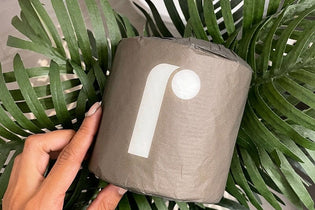
TLDR
Bamboo, a plant that has become synonymous with the lush green landscapes of East Asia and Southeast Asia, has intrigued the culinary world for centuries. While its towering presence and hardy culms might lead some to question, "Is bamboo edible?"
The answer is a resounding yes – with some caveats.
In this comprehensive guide, we will explore the edibility of bamboo, its nutritional benefits, how to safely prepare it for consumption, and its growing role in modern cuisine. Additionally, we will touch upon the sustainable practices in cultivating bamboo, exemplified by companies like Reel Paper in their eco-friendly bamboo-based products.
The Edibility of Bamboo
Bamboo is commonly seen as a symbol of resilience and versatility in nature, but its utility extends beyond construction and decor to the realm of edible plants. The question of its edibility often arises due to its woody, tree-like appearance, but beneath this exterior lies a culinary gem - the bamboo shoot. What are bamboo shoots, you ask?
Nutritional Value of Bamboo Shoots
You might wonder why pandas eat bamboo. Bamboo shoots are not only edible but also highly nutritious. They are low in calories but rich in dietary fibers, vitamins, and essential minerals, making them a healthful addition to any diet. Fresh bamboo shoots, when harvested correctly, can be a delicious and nutrient-packed ingredient in various dishes. This edible part of the bamboo plant is particularly valued in many Asian cultures for its versatility in recipes and its health-promoting properties, including aiding digestion and reducing cholesterol.
Popular Edible Bamboo Species
There are different types of bamboo that are more favored for their edible shoots. Phyllostachys vivax, commonly known as 'Vivax Bamboo', and Phyllostachys edulis, known as 'Moso Bamboo', are popular choices. These species are not only known for their edible quality but also their unique flavors and textures, making them a sought-after ingredient in several Asian cuisines. In addition to these, other notable species like Dendrocalamus asper is cultivated for their fresh shoots, which are treasured in various culinary traditions for their distinct taste.
Preparing Bamboo for Consumption
Preparing bamboo for consumption is an art that transforms this hardy plant into a delicious and versatile ingredient. From the initial harvest to the various cooking techniques that unlock their potential, there are some key practices that not only make bamboo shoots safe for consumption but also enhance their natural flavors, making them a cherished component in diverse cuisines.
Harvesting Bamboo Shoots
The key to enjoying bamboo shoots lies in their timely harvesting. Young shoots are usually harvested in the spring when they are just emerging from the ground. This ensures they are at their tenderest and most flavorful, ideal for culinary use. Harvesting bamboo shoots requires knowledge and skill, as the timing and method of harvest can significantly affect their quality and taste.
Cooking and Recipes
Once harvested, bamboo shoots require proper preparation, which typically involves boiling to remove any bitterness. They can then be incorporated into a variety of recipes – from stir-fries and soups to more elaborate dishes. Bamboo sprouts offer a crunchy texture and a subtle, earthy flavor that compliments many other ingredients. In cooking, they are highly versatile and can be used in both savory and sweet dishes, often acting as a vehicle for other flavors in the dish.
Safety and Health Considerations
While bamboo shoots offer a range of health benefits and culinary delights, it's important to approach their consumption with certain safety and health considerations in mind. Not all parts of the bamboo plant are edible, and improper preparation of bamboo shoots can lead to health risks.
Potential Risks and Allergies
While bamboo shoots are generally safe to eat, they can pose risks if not prepared correctly. Raw bamboo shoots contain natural toxins that can be harmful, so it's crucial to cook them thoroughly. Additionally, like any food, they can cause allergic reactions in some individuals, necessitating caution in their consumption. It's recommended to introduce bamboo shoots into the diet gradually and observe for any adverse reactions, especially if consuming them for the first time.
Proper Preparation to Avoid Toxicity
To ensure the safe consumption of bamboo shoots, it's important to boil them before use, as this process helps to remove any harmful toxins. It's also advisable to change the water once or twice during boiling to ensure all toxins are eliminated. For those new to cooking with bamboo, it's beneficial to seek guidance on proper preparation techniques to ensure both safety and optimal flavor.

Bamboo in Modern Cuisine
Bamboo's journey from ancient forests to modern kitchens exemplifies its adaptability and enduring appeal in culinary traditions around the world. In contemporary cuisine, bamboo shoots have transcended their traditional Asian roots to become a globally recognized ingredient.
Bamboo Shoots in Asian Cuisine
Bamboo shoots have long been a staple in Asian cuisine, revered for their versatility and unique taste. In dishes across East Asia and Southeast Asia, from the bamboo shoot curries of Thailand to the stir-fried bamboo delicacies of China, they add a distinctive crunch and flavor that is integral to many regional recipes. Their popularity in Asian cuisine is a testament to their adaptability in various cooking methods, whether they are boiled, fermented, or pickled.
Innovative Uses of Bamboo in Western Cooking
In recent years, bamboo shoots have made their way into Western cooking, where innovative chefs are using them in everything from salads to main courses. Their unique texture and flavor profile have been embraced in a variety of culinary creations, showcasing bamboo's global appeal. As Western palates become more adventurous, both fresh and canned bamboo shoots are finding their place in fusion dishes, adding an exotic twist to familiar flavors.
Environmental Impact of Cultivating Bamboo
The cultivation of bamboo stands as a prime example of how sustainable agricultural practices can positively impact the environment. This resilient and fast-growing plant offers a green alternative to more traditional farming and wood cultivation methods, presenting numerous ecological benefits.
Sustainability of Bamboo Farming
Bamboo farming stands out for its low environmental impact and sustainability. Bamboo plants grow rapidly, require minimal water and pesticides, and can be harvested without damaging the plant or soil. This makes them a more eco-friendly alternative to traditional wood pulp, especially in regions like Southeast Asia and East Asia. The ecological benefits of bamboo farming extend beyond its rapid growth, as bamboo forests also play a crucial role in carbon sequestration and biodiversity preservation.
Bamboo vs. Traditional Wood Pulp
When compared to traditional wood pulp, bamboo is a more sustainable living option. It grows faster, sequesters more carbon, and its cultivation is less resource-intensive. This makes bamboo an ideal choice for eco-conscious consumers and businesses looking to reduce their environmental footprint. The use of bamboo in place of wood can significantly reduce deforestation and the carbon footprint associated with timber harvesting. Moreover, bamboo's versatility means it can be used for a wide range of products, from construction materials to paper products, further enhancing its value as a sustainable resource.
Bamboo Beyond Food: Reel Paper's Sustainable Approach
Embracing the sustainability and versatility of bamboo, Reel Paper offers bamboo toilet paper, a product that aligns with the growing consumer demand for environmentally responsible choices. Made from bamboo, this toilet paper is not only soft and strong but also a testament to how everyday products can contribute to a more sustainable world.
By choosing Reel Paper, consumers support a movement towards greener, more eco-conscious living, making a positive impact with each roll. In addition to bamboo toilet paper, Reel Paper also offers a range of other eco-friendly products such as bamboo paper towels, recycled paper towels, and recycled facial tissue, further demonstrating a commitment to environmental sustainability. These products are not only better for the planet but also offer high quality and performance, making them an excellent choice for eco-minded consumers.
Sources:
- Amjera, Rachael. 2021. “Bamboo Shoots: Nutrients, Benefits, and More.” Healthline. May 14, 2021. https://www.healthline.com/nutrition/are-bamboo-shoots-good-for-you.
- Allday, Dewayne. 2019. “Identifying, Harvesting & Cooking Bamboo.” EcoFarming Daily. June 12, 2019. https://www.ecofarmingdaily.com/grow-crops/grow-fruits-vegetables/fruit-and-vegetable-crops/identifying-harvesting-cooking-bamboo/.
- Wikipedia Editors. 2022. “Dendrocalamus Asper.” Wikipedia. September 26, 2022. https://en.wikipedia.org/wiki/Dendrocalamus_asper.
- DGB Group | Carbon Offsetting & Nature Conservation. 2023. “What Kind of Nature Benefits Does Bamboo Offer?” Www.green.earth. March 29, 2023. https://www.green.earth/blog/what-kind-of-nature-benefits-does-bamboo-offer.




0 comments